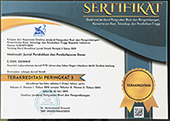Redefinisi Peran Orang Tua Dalam Pendidikan; Penanaman Sikap Anti Radikalisme Sejak Usia Dini
Abstract
Radicalism easily impacts young people who are silence, unemployed, having less social interaction and religion education problem. online media is the most effective dissemination media for radicalism and terrorism. On the other side, industry revolution 4.0 causes the increment of unemployed young people. In education, industry revolution causes the change of learning system from conventional to digital; e-learning. Online learning source has several advantages; however, there are also several negative effects. The more learning online source used, the filter of the negative effects should be increased, otherwise, the increment of unemployed and the high-intensity use of online media will affect the dissemination of radicalism significantly. Education institution could not filter the sources accessed by pupil by oneself. In this case, parents play important role to keep children’s spiritual, moral, emotional and social education good. Unfortunately, a lot of parents no longer realize their role as educator, especially a mother who decides to be a carrier woman. All this time, education is imposed to teacher and education institution, while parents only play a complement role. Parents should be the main educators of their children in order to prevent quick dissemination of radicalism. This article attempts to analyze guidance from the Hadith of prophet Muhammad PBUH for parents so that all aspects of their children’s education based on affection and they are anti-radicalism from the early childhood. Based on that foundation, the children would not be influenced by extremisme and terrorisme on behalf of religion.
Keywords
References
أبو عبد الله أحمد بن محمد بن حنبل بن هلال بن أسد الشيباني. (2001) مسند الإمام أحمد بن حنبل. مؤسسة الرسالة.
البخاري. محمد بن إسماعيل أبو عبد الله. صحيح البخاري. لبنان : المكتبة العصرية
الترمذي، محمد بن عيسى. (1998) الجامع الكبير سنن الترمذي. بيروت : دار الغرب الإسلامي
الحازميي, خالد بن حامد. (2000) أصول التربية الإسلامية. المدينة المنوورة: دار العالم الكتب
السيوطي . جلال الدين. الجامع الصغير من حديث البشير و النذير
سليمان بن الأشعث بن إسحاق. (2010) سنن أبي داود. صيدا – بيروت : المكتبة العصرية.
Amin Hoesin, Oemar. (1975). Filsafat Islam. Jakarta: Bulan Bintang
Azzat, Akhmad Muhaimin. (2014) Mengembangkan Kecerdasan Spiritual bagi Anak. Jakarta: Ar-Ruzz Media.
Badan Nasional Penanggulangan Terorisme. (2018). Diary Perdamaian. Mengenal, Mewaspadai, dan Mencegah Terorisme di Kalangan Generasi Muda. Pusat Media Damai.
Baumrind, D., Larzelere RE, & Cowan PA. (2002) Ordinary Physical Punishment: Is It Harmful? Comment on Gershoff. Psychol Bull, 128(4):580-9
Coper, Robert K. dan A. Sawaf. (1998) Executive EQ: Kecerdasan Emosional dalam Kepemimpinan dan Organisasi. Jakarta: PT. Gramedia Pustaka Utama.
Gershoff, ET. (2002) Corporal Punishment By Parents And Associated Child Behaviors And Experiences: A Meta-Analytic And Theoretical Review. Psychol Bull, 128(4): 539-79.
Goleman, Daniel. (1995). Emotional Intelligence. Bantam Books.
Hart, C. H., Newell, L. D., & Olsen, S. F. (2003). Parenting skills and social-communicative competence in childhood. In J. O. Greene & B. R. Burleson (Eds.), Handbook of communication and social interaction skills. Mahwah, NJ, US: Lawrence Erlbaum Associates Publishers.
Hurlock, Elizabeth B. (2011). Psikologi Perkembangan: Suatu Pendekatan Sepanjang Rentang Kehidupan. Jakarta: Erlangga.
Kostelnik, Marjorie J., Anne K. Soderman, Alice P. Whiren, & Michelle L. Rupiper. (2015) Developmentally Appropriate Curriculum: Best Practices in Early Childhood Education, 6th Edition. Pearson
Megawangi, Ratna. (2003). Pendidikan Karakter untuk Membangun Masyarakat Madani. IPPK Indonesia Heritage Foundation.
Ormrod, Jeanne Ellis. (2009). Essentials of Educational Psychology, 2nd Edition. Pearson.
Salkind, Neil J., & Delbert C. Miller. (2002). Handbook of Research Design & Social Measurement. SAGE.
Santrock, John W. (2000). Educational Psychology. McGraw-Hill Higher Education
---------------------- (2007). Perkembangan Anak, Jilid Dua. Jakarta: Erlangga.
Sinetar, Marsha. (2000). Spiritual Intelligence, Belajar dari Anak yang Mempunyai Kesadaran Diri. Jakarta: PT Gramedia.
Slade, EP & Wissow LS. (2004) Spanking In Early Childhood And Later Behavior Problems: A Prospective Study Of Infants And Young Toddlers. Pediatrics, 113(5):1321-30.
Sukidi. (2002). Rahasia Sukses Hidup Bahagia Kecerdasan Spiritual; Mengapa SQ Lebih Penting daripada IQ dan EQ. Jakarta: PT Gramedia Pustaka Utama.
Suveg, Cynthia., Janice Zeman, Ellen Flannery-Schroeder, & Michael Cassano. (2005). Emotion Socialization in Families of Children With an Anxiety Disorder. Journal of Abnormal Child Psychology, 33 (2): 145–155
Tarikuddin. (2006). Riwayat Hidup 4 Imam Mazhab. Johor: Perniagaan Jahabersa.
‘Ulwan, Abdullah Nashih. (2014). Pendidikan Anak Dalam Islam. Solo: Insan Kamil.
Wollstonecraft, Mary. (2002). A Vindication of the Rights of Woman. Project Gutenberg
Zamroni & Umairoh. (2011). ESQ dan Model Kepemimpinan Pendidikan Kontruksi Sekolah Berbasis Spiritual. Semarang: Rasail Media Group.
DOI: https://doi.org/10.18860/madrasah.v10i2.5111
Copyright (c) 2018 Madrasah: Jurnal Pendidikan dan Pembelajaran Dasar

This work is licensed under a Creative Commons Attribution-NonCommercial-ShareAlike 4.0 International License.
INDEXED & SUPPORTED BY:
Madrasah: Jurnal Pendidikan dan Pembelajaran Madrasah is licensed under a Creative Commons Attribution-ShareAlike 4.0 International License.
EDITORIAL OFFICE
Fakultas Ilmu Tarbiyah dan Keguruan
Universitas Islam Negeri Maulana Malik Ibrahim Malang
Jalan Gajayana 50 Malang 65144, Jawa Timur, Indonesia
Telp/Fax: +62341-552398
Email: madrasah@uin-malang.ac.id
Website:https://ejournal.uin-malang.ac.id/index.php/madrasah



















